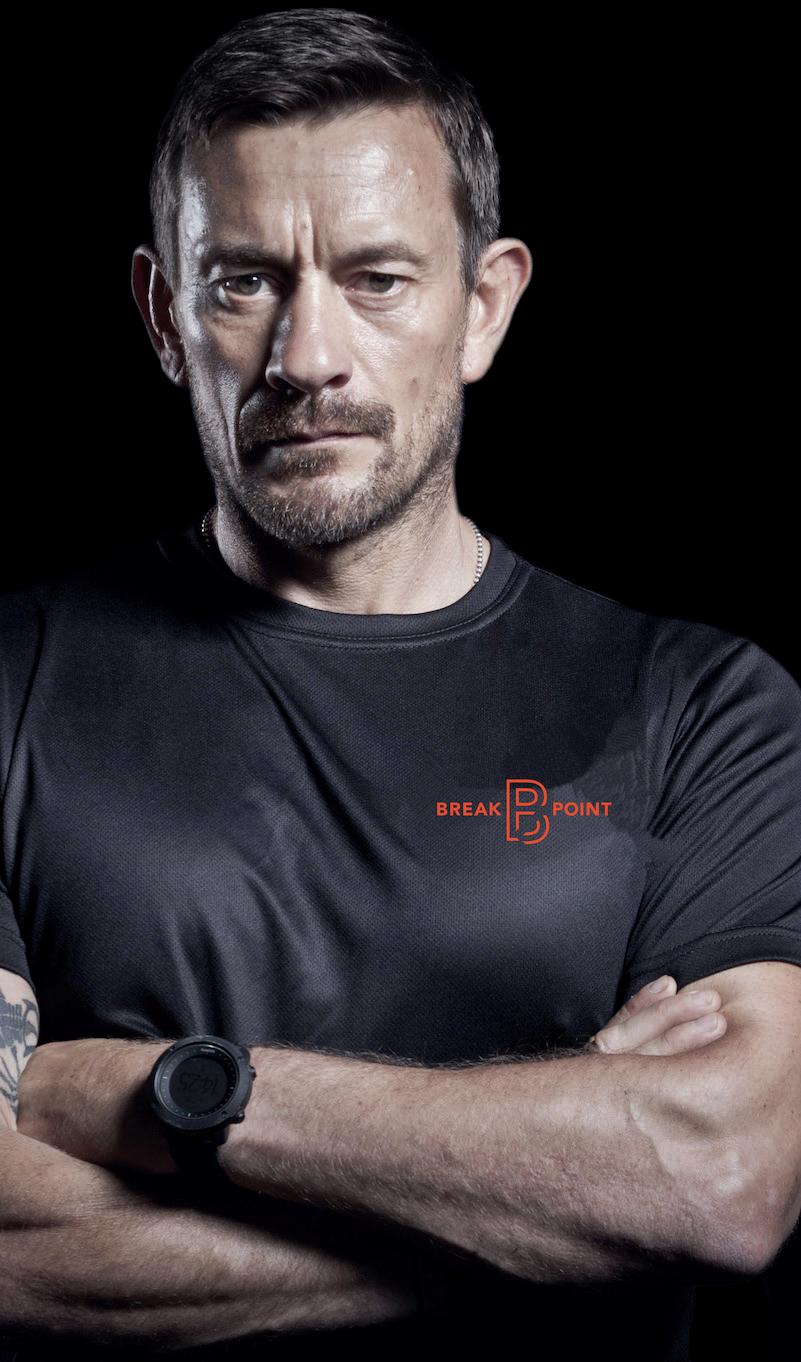
5 minute read
we are wired to take shortterm comfort that leads to long-term pain

Ollie Ollerton is a former UK Special Forces operative, best known for appearing on the hit Channel 4 TV show SAS: Who Dares Wins. He is also the Founder and Managing Director at BreakPoint, a training company that utilises special forces techniques to deliver courses and workshops for corporate teams and leaders. We spoke to Ollie about the events that led him to start his own business, why reaching your breaking point can be positive and the benefits of not taking the path of least resistance.
WHAT WAS YOUR LIFE LIKE GROWING UP AND WHAT MOTIVATED YOU TO JOIN THE SPECIAL FORCES IN THE FIRST PLACE?
That’s a complex question because I had a colourful upbringing. I had a traumatic experience at the age of ten and I can’t remember anything before that. I was attacked at a circus by a chimp and was nearly killed. It’s had a massive impact on who I am today because I didn’t deal with that trauma at the time.
This experience gave me a low sense of consequence and made me quite unemotional. I didn’t empathise with others’ emotions. I was always looking for danger and to push the envelope, which got me into a lot of trouble with the police and caused me a lot of heartache with my family.
WHEN DID YOU DECIDE TO JOIN THE SPECIAL FORCES?
For my mum, all her energy went into helping me focus on what I loved: fitness. I was greatly into athletics and the 1,500-metre run. Something just clicked with the Royal Marine Commandos – which is a bold thing for a 14-year-old to decide.
I was in Northern Ireland and then got called to Iraq and I was quite deflated because it wasn’t dangerous enough. It was a crossroads for me because I could either go to the special forces or be a civilian. The path of least resistance would have been to be a civilian.
My commanding officer at the time was shocked I was even considering this path, which was a shock to me because I didn’t understand his belief in me as a soldier. I had a lot of self-doubt at the time, and I think a lot of that came from idolising being in the military from such a young age.
This is the power of leadership – because what my commanding officer said, and his belief in me, changed my life and made me feel like I had a duty to try for the special forces. In those moments of self-doubt, I told myself to focus only on what I was doing that day, and don’t stagnate.
WHEN DID YOU GO BACK TO BEING A CIVILIAN?
After six years, I went back to being a member of the public and said I would never go back to being in a war zone. Although, shortly enough, I ended up back in a war zone because I went back to doing what I knew best. I earned more money as a contractor in Iraq than I did in two years on the special forces, however, it was corrosive to who I was as a person.
We were getting attacked on a regular basis and that developed an unhealthy relationship with alcohol for me. Being hungover mixed with the anxiety of being in a warzone, I started taking Valium – you don’t need to be a psychiatrist to understand this isn’t the best combination. I decided to get out of there because if I didn’t go off on my own accord, I would have come back in a box.
I then went to Southeast Asia to save children from child prostitution. It was the best thing ever. I also felt like I’d found the piece I was missing from those military days. For the first time in my life, I was right on the coalface of being in service of others. This later became the heartbeat and DNA for BreakPoint – my mission statement is to develop a globally identified brand recognised for the positive growth and development of others.
DO YOU THINK THAT FIRST EXPERIENCE WITH THE CHIMP MADE YOU MORE LIKELY TO CHASE ADRENALINE-FILLED EXPERIENCES AND LESS SCARED OF DEATH?
That’s a difficult question because I don’t have an alternative journey to compare to. I would say there were positive and negative aspects to that traumatic experience. As a result of that experience, I was very dissatisfied and was always seeking as much as I could out of life – I didn’t know where to direct that energy and I didn’t understand who I was as a person. I didn’t understand what ‘purpose’ was.
I was suicidal at points – I never tried to commit suicide though – but then I took responsibility for my own life. For the first time, I stopped blaming the outside world for my issues – I stopped blaming the chimp, I stopped blaming the military and stopped blaming my upbringing. Yes, these difficult things happen in our lives but how we deal with them is really down to us.
DO YOU THINK IF YOU GO THROUGH ADVERSITY, YOU ARE MORE LIKELY TO HAVE CHARACTERISTICS LIKE DISCIPLINE, DETERMINATION AND MOTIVATION?
100% – there’s nothing like a near-death experience as a wake-up call. My first one was at the age of ten and that wasn’t my last one. I don’t think everyone needs to have had a near-death experience to find the value of life.
People look at me as someone who is resilient and determined, but people must understand that I don’t find it easy. I’m just like everyone else. I bleed and breathe like anyone else. Being the best version of yourself every day and being that constant model of improvement is a battle.

I still have that negative voice, but I know how to understand my emotions and I’m not a victim of them. We really must understand the source code of who we are as humans. The majority of people tiptoe through life just hoping they make it to death safely – you’ve really got to try and get the most out of everything.
WHAT DO YOU TELL YOURSELF IN THOSE MOMENTS WHEN YOU WANT TO GIVE UP?
BreakPoint is a disruptive change in habitual behaviour under a pre-determined goal. Bad behaviour is habitual, so it’s about understanding that we’re going to do something that is going to disrupt that habitual behaviour.
We have to make sure we know where we’re going, and we have to make sure the place we are going gives us so much passion and determination that we are prepared to deal with the discomfort of getting there.
We are wired to take short-term comfort that leads to long-term pain. People just throw in the towel when it’s far too much and then they regret giving up – you need to become aware of the thoughts and emotions going on inside of yourself and also have a strong ‘why’ – this will overpower any doubt. You don’t need to see the path or the footprints of the journey, you create them.
WHEN YOU DO FACE THOSE MOMENTS OF SELF-DOUBT, WHAT DO YOU DO?
Some people think: “Oh Ollie won’t have self-doubt.” Everyone has self-doubt, it’s what makes us human. But if you’re prepared for it, it’s not such a shock to the system. The more you focus on anything, the bigger it becomes. If you allow that to be the dominant message in your mind, it’s going to win.
It’s important to have a positive affirmation that dilutes any negativity. As soon as that negative thought comes in, you throw in that positive affirmation. The more you do that, you’re brainwashing yourself with positive thoughts in the same way the negative thoughts try to brainwash you.
Everyone is wired negatively. That goes back to our primal days –we are always looking for the things that may cause us danger.
The idea that life is hassle-free and problem-free is a utopia. The fact of the matter is, we were born out of struggle, we thrive through struggle, and I thank God for problems because it makes me grow. If there is nothing that is challenging you, you are going to have a very flat and boring life. Not only that, but you will go through some level of depression at some stage.
THE BUSINESS LEADER PODCAST NOW AVAILBLE ON










